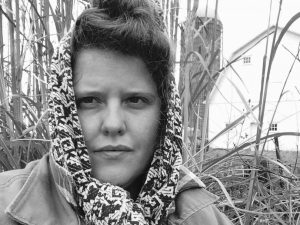Our office has moved! Our new address is 414 S 17th St., Suite 107 in Ames, Iowa.
Meredith Nunnikhoven
 Meredith Nunnikhoven
Meredith Nunnikhoven
Oskaloosa – Barnswallow Flowers & Produce
Why do you want to farm?
Farming has been a love-hate relationship for me. When my parents encouraged me to attend college in something other than agriculture, it was hard for me to understand at the time – and beyond confusing. I have an off-farm career managing independent filmmaking for TV and independent movies on-location. However, this is not a passion and it keeps me away from the farm for long periods of time.
When not on-location with filmmaking, I give much of my personal life to helping my parents farm. I ultimately want to farm to allow for further economic opportunity not only for myself, but for other Mahaska County residents in a very economically depressed area of Iowa.
While Barnswallow Flowers & Produce would be more successful if located closer to a major metropolitan area – because I could charge ten-fold for all our products – large financial success is not what encourages my drive to farm.
What I’ve found challenging and encouraging is improving the lives of those directly around, and being able to pay my bills. There is much joy and success through providing employment, giving internship opportunities through William Penn University and Central College, giving people the choice to purchase locally grown product, raising produce that’s chemical-free and collaborating with our community on a very transparent level to help preserve our small family farm.
What are you farming right now?
Currently, my farm operation includes several diverse entities. In 2018, I launched Barnswallow Flowers & Produce with my mother, Kerrilyn, as a diversified sister-business to Nunnikhoven Farms, Inc. I manage and operate Barnswallow Flowers & Produce , which provides locally grown flowers and produce to consumers in Mahaska and surrounding counties. Our crops are grown with environmental consciousness amongst our farm operation, fields and trees.
Knowing we wanted to ensure our product was sold before attempting to grow, we committed to the following business structure ventures: 1) floral bouquet 14-week CSA deliveries 2) restaurant-to-table produce weekly deliveries 3) chestnut grove in development for U-pick and chestnut co-op sales and 4) other sustainable crops like hemp, quinoa, amaranth are being explored.
The CSA floral program delivers fresh-cut floral bouquets for 14 weeks in both Mahaska and Marion counties. This program lets us financially support early-year expenses in seed, soil and energy in the winter months. We also sell everything from farm bouquets, to celebration-of-life pieces, to DIY bridal packages.
Our produce is grown with input from local chefs, thus minimizing waste and maximizing our purchase of heirloom seeds in the winter. In just two years, we’ve developed solid relationships with five chefs in three neighboring counties who decide on specific heirloom produce grown only for their establishments. This streamlined approach helps assure us that our labor to grow produce outside will be profitable (we do not have hoop houses).
Developing our chestnut grove is a dream that not been financially possible due to development of our floral and produce programs. Having the chestnut grove would let our farm operation diversify with a crop that is growing in demand due to change in human consumption and diet.
What’s your vision for your farm?
I want our farm to be an emblem of successful, sustainable planning and positive farm practices that allows us to operate into the next 100 years. Since the farm is located on Iowa Route 23 outside Oskaloosa, this is even more important as hundreds of people drive by daily.
We have the opportunity to show everyone that small-farm diversification in rural Iowa is possible; that preserving the existence of small farms is possible; and that women everywhere can do it if they try. I see our farm being a place for meetings and educational events, a gathering space for continued community education and emblematic of excellence in conservation practices like cover crops, waterway maintenance and diversified crops.
Farming is a business, and I feel diversification in rural areas is the only way to continue being financially stable in the coming years.
Why do you want to participate in this program?
Living in rural Mahaska County is an isolating experience. I need ways to network and connect with other regionally accessible growers. Diversifying for long-term sustainability is financially expensive and determines long-term success.
Any opportunity to aid everyday needs improves the efficiency of production. Additionally, so few programs truly help female begining farmers in Iowa. In early 2018, I was unable to apply to rent and operate the Harold Darner Trust Farm for the simple fact that I was not married. Through SIP, I will have an opportunity to coordinate my goals with financial, educational and mentoring support.
